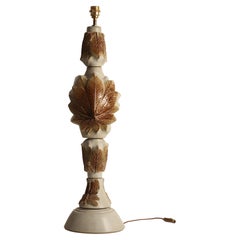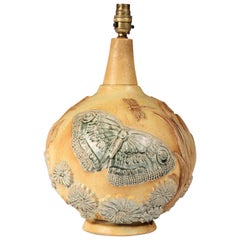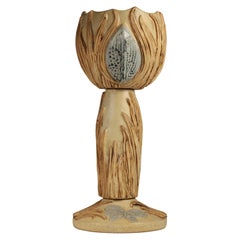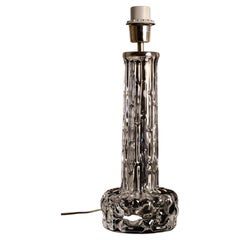Want more images or videos?
Request additional images or videos from the seller
1 of 14
Bernard Rooke Brutalist Honey Bee and Leaf Pattern Table Light
$928.78List Price
About the Item
- Creator:Bernard Rooke (Maker)
- Dimensions:Height: 15.75 in (40 cm)Width: 7.29 in (18.5 cm)Depth: 4.73 in (12 cm)
- Style:Brutalist (Of the Period)
- Materials and Techniques:
- Place of Origin:
- Period:
- Date of Manufacture:1960s-1970s
- Condition:Wear consistent with age and use. This light has been professionally rewired and PAT tested and will easily rewire for all regions. Weight 2.5kg.
- Seller Location:London, GB
- Reference Number:1stDibs: LU2868326366502
About the Seller
5.0
Gold Seller
Premium sellers maintaining a 4.3+ rating and 24-hour response times
Established in 2015
1stDibs seller since 2017
199 sales on 1stDibs
Authenticity Guarantee
In the unlikely event there’s an issue with an item’s authenticity, contact us within 1 year for a full refund. DetailsMoney-Back Guarantee
If your item is not as described, is damaged in transit, or does not arrive, contact us within 7 days for a full refund. Details24-Hour Cancellation
You have a 24-hour grace period in which to reconsider your purchase, with no questions asked.Vetted Professional Sellers
Our world-class sellers must adhere to strict standards for service and quality, maintaining the integrity of our listings.Price-Match Guarantee
If you find that a seller listed the same item for a lower price elsewhere, we’ll match it.Trusted Global Delivery
Our best-in-class carrier network provides specialized shipping options worldwide, including custom delivery.You May Also Like
Mid-Century Bernard Rooke Studio Ceramic TOTEM Lamp Natural Tones, England
By Bernard Rooke
Located in London, GB
A heavy ceramic TOTEM lamp by Bernard Rooke, England. Mid-20th century, England.
The totem is a sculptural statement piece - floor or table size - made up of ceramic elements in nat...
Category
Vintage 1960s English Mid-Century Modern Table Lamps
Materials
Metal
$4,079
H 29.53 in W 7.49 in D 6.3 in
Ceramic Table Lamp by Bernard Rooke c. 1960s
By Bernard Rooke
Located in Glasgow, GB
An uncommon and quietly expressive example of Bernard Rooke’s studio pottery, this handcrafted ceramic table lamp dates to the 1960s and reflects a more organic, almost lyrical direc...
Category
Mid-20th Century English Brutalist Table Lamps
Materials
Ceramic
Bernard Rooke Brutalist Pottery Table Lamp, UK 1960's
By Bernard Rooke Studio
Located in New York, NY
Brutalist table lamp by Bernard Rooke in a Mayan pattern with a textured finish and a nuanced green and ochre glaze. Size of the base only. No shade included.
Category
Mid-20th Century British Brutalist Table Lamps
Materials
Brass
Bernard Rooke Studio Pottery Lamp C. 1970s
By Bernard Rooke
Located in Hoddesdon, GB
Bernard Rooke Studio Pottery Brutalist Style Owl Lamp is a beautifully sculpted lamp made by the renowned British artist and potter, Bernard Rooke. It serves as a lovely example of h...
Category
Vintage 1970s British Brutalist Table Lamps
Materials
Pottery
Bernard Rooke Pottery Lamp, England 1970's
By Bernard Rooke
Located in New York, NY
Brutalist pottery lamp by Bernard Rooke. Stamped. Rewired.
Category
Mid-20th Century British Brutalist Table Lamps
Materials
Pottery
Pair of Bernard Rooke Ceramic Lamps
By Bernard Rooke
Located in Palm Springs, CA
Pair of ceramic lamps by Bernard Rooke. Lamps have been professionally rewired with new black wood bases. Measures: Ceramic portion is 13" high. Brass neck is 3" high. Wood base is 9...
Category
Vintage 1970s English Table Lamps
Materials
Ceramic
Bernard Rooke Table Lamp with Original Shade, England, 1960
By Bernard Rooke
Located in Paris, FR
Bernard Rooke table lamp with original shade England 1960.
This design is also an early example of Rooke's work, probably from the 1960s. A sculptural piece, composed of handcrafted...
Category
Mid-20th Century English Mid-Century Modern Table Lamps
Materials
Ceramic, Earthenware
Bernard Rooke ceramic table Lamps a pair Signed England 1960
By Bernard Rooke
Located in Paris, FR
Bernard Rooke ceramic table lamp made in England 1960. Stamped on the lower part of the ceramic by the Artist. A sculptural piece, composed of handcrafted ceramic elements in natur...
Category
Mid-20th Century English Mid-Century Modern Table Lamps
Materials
Ceramic
Large Ceramic Table Lamp Designed by Bernard Rooke, England, 1960s
By Bernard Rooke
Located in Aachen, NRW
A rare table lamp by Bernard Rooke, England, 1960s. Sculptural piece, made of handmade ceramic elements in natural tones of terracotta and stone.
Stunning form and color- Good qual...
Category
Vintage 1970s English Mid-Century Modern Table Lamps
Materials
Ceramic
$1,545
H 17.72 in W 7.88 in D 3.94 in
Large Ceramic Table Lamp Designed by Bernard Rooke, England, 1960s
By Bernard Rooke
Located in Aachen, NRW
A rare table lamp by Bernard Rooke, England, 1960s. Sculptural piece, made of handmade ceramic elements in natural tones of terracotta and stone.
Stunning form and color- Good qual...
Category
Vintage 1970s English Mid-Century Modern Table Lamps
Materials
Ceramic
$1,545
H 17.72 in W 7.88 in D 3.94 in
More From This Seller
View AllBernard Rooke Brutalist Dragon Fly and Leaf Floor Lamp Organic Style 1960-1970
By Bernard Rooke
Located in London, GB
An organic and Brutalist style Floor Lamp with Dragon Fly and Leaf design. No chips or cracks. Easily rewired for all regions.
Bernard Rooke (born 1938) is a British artist and studio potter. Rooke has exhibited his "Brutalist" ceramics and painting both in the UK and abroad with work in many collections both public and private including the Victoria and Albert Museum, Cleveland Museum of Art, Nuffield Foundation, Röhsska Museum in Sweden and the Trondheim Kunstmuseum in Norway. Bernard Rooke attended Ipswich School of Art studying painting and lithography before going on to study at Goldsmiths College of Art. It was while studying here that he decided to take up pottery. Although unfamiliar with this craft and tradition, he found that working with clay provided new opportunities for freedom of interpretation and creativity. In 1960 Rooke set up his first pottery in Forest Hill in South London along with Alan Wallwork. It was a very small room with enough space for a small electric kiln. He was initially using mainly hand building, coiling, blocking and slabbing techniques. While researching ideas, he was supporting himself by part-time lecturing at London University, Goldsmiths College and St Mary's College. In addition, Rooke's membership of 'The Craftsman Potters' Association' enabled him to show his work in a shop in Carnaby Street in London. In 1967, both the need for a larger working space and becoming disillusioned with living in London spurred Rooke into moving out of the city and to an old mill building in Swilland in Suffolk. Rooke wanted to widen the range of work so as to become more commercial. With the birth of his son, Aaron, and much needed work to be done on the mill, it was important to be able to make a living. In 1968, the Grand Metropolitan Hotel commissioned Rooke to make 120 standard lamps, 120 table lamps as well as a 24 foot long ceramic mural and another 9 foot high, which incorporated interior lighting. The money from the commission helped to pay for much needed restoration work on the mill. By the 1970s, a gallery space was opened in the windmill and run by Susan Rooke, Bernard's wife, selling work to locals and tourists as well as to American airmen based nearby. The vision for Mill Gallery was beginning to develop and alongside this a reputation was building bringing in a good source of income. Sons Aaron and Felix were becoming more involved with the running of the pottery, giving Bernard more time to develop new ideas and designs and more time to continue with his painting. In 2004, the Rooke family decided not to sell to the public through the gallery anymore and close the pottery to concentrate more on painting and printmaking. In 2017 Bernard's lighting was featured in the Exhibition: “Glass, Light, Paint & Clay” at the Peterborough Museum and Art Gallery. The exhibition featured four artists: Bernard Rooke, John Maltby...
Category
Vintage 1960s English Brutalist Floor Lamps
Materials
Pottery
Mid-Century Modern Brutalist Ceramic Table Lamp by Bernard Rooke
By Bernard Rooke
Located in London, GB
An organic and Brutalist style Butterly table lamp. No chips or cracks. Easily retired for all regions.
Bernard Rooke (born 1938) is a British artist and studio potter. Rooke has exhibited his "Brutalist" ceramics and painting both in the UK and abroad with work in many collections both public and private including the Victoria and Albert Museum, Cleveland Museum of Art, Nuffield Foundation, Röhsska Museum in Sweden and the Trondheim Kunstmuseum in Norway.
Bernard Rooke attended Ipswich School of Art studying painting and lithography before going on to study at Goldsmiths College of Art. It was while studying here that he decided to take up pottery. Although unfamiliar with this craft and tradition, he found that working with clay provided new opportunities for freedom of interpretation and creativity.
In 1960 Rooke set up his first pottery in Forest Hill in South London along with Alan Wallwork. It was a very small room with enough space for a small electric kiln. He was initially using mainly hand building, coiling, blocking and slabbing techniques. While researching ideas, he was supporting himself by part-time lecturing at London University, Goldsmiths College and St Mary's College. In addition, Rooke's membership of 'The Craftsman Potters' Association' enabled him to show his work in a shop in Carnaby Street in London.
In 1967, both the need for a larger working space and becoming disillusioned with living in London spurred Rooke into moving out of the city and to an old mill building in Swilland in Suffolk. Rooke wanted to widen the range of work so as to become more commercial. With the birth of his son, Aaron, and much needed work to be done on the mill, it was important to be able to make a living.
In 1968, the Grand Metropolitan Hotel commissioned Rooke to make 120 standard lamps, 120 table lamps as well as a 24 foot long ceramic mural and another 9 foot high, which incorporated interior lighting. The money from the commission helped to pay for much needed restoration work on the mill.
By the 1970s, a gallery space was opened in the windmill and run by Susan Rooke, Bernard's wife, selling work to locals and tourists as well as to American airmen based nearby. The vision for Mill Gallery was beginning to develop and alongside this a reputation was building bringing in a good source of income.
Sons Aaron and Felix were becoming more involved with the running of the pottery, giving Bernard more time to develop new ideas and designs and more time to continue with his painting. In 2004, the Rooke family decided not to sell to the public through the gallery anymore and close the pottery to concentrate more on painting and printmaking.
In 2017 Bernard's lighting was featured in the Exhibition: “Glass, Light, Paint & Clay” at the Peterborough Museum and Art Gallery. The exhibition featured four artists: Bernard Rooke, John Maltby...
Category
Vintage 1970s English Brutalist Table Lamps
Materials
Clay
Mid Century Modern Ceramic Jardinière by Bernard Rooke
By Bernard Rooke
Located in London, GB
An organic and Brutalist style Jardine which would work perfectly with trailing foliage.
Bernard Rooke (born 1938) is a British artist and studio potter. Rooke has exhibited his "Brutalist" ceramics and painting both in the UK and abroad with work in many collections both public and private including the Victoria and Albert Museum, Cleveland Museum of Art, Nuffield Foundation, Röhsska Museum in Sweden and the Trondheim Kunstmuseum in Norway.
Bernard Rooke attended Ipswich School of Art studying painting and lithography before going on to study at Goldsmiths College of Art. It was while studying here that he decided to take up pottery. Although unfamiliar with this craft and tradition, he found that working with clay provided new opportunities for freedom of interpretation and creativity.
In 1960 Rooke set up his first pottery in Forest Hill in South London along with Alan Wallwork. It was a very small room with enough space for a small electric kiln. He was initially using mainly hand building, coiling, blocking and slabbing techniques. While researching ideas, he was supporting himself by part-time lecturing at London University, Goldsmiths College and St Mary's College. In addition, Rooke's membership of 'The Craftsman Potters' Association' enabled him to show his work in a shop in Carnaby Street in London.
In 1967, both the need for a larger working space and becoming disillusioned with living in London spurred Rooke into moving out of the city and to an old mill building in Swilland in Suffolk. Rooke wanted to widen the range of work so as to become more commercial. With the birth of his son, Aaron, and much needed work to be done on the mill, it was important to be able to make a living.
In 1968, the Grand Metropolitan Hotel commissioned Rooke to make 120 standard lamps, 120 table lamps as well as a 24 foot long ceramic mural and another 9 foot high, which incorporated interior lighting. The money from the commission helped to pay for much needed restoration work on the mill.
By the 1970s, a gallery space was opened in the windmill and run by Susan Rooke, Bernard's wife, selling work to locals and tourists as well as to American airmen based nearby. The vision for Mill Gallery was beginning to develop and alongside this a reputation was building bringing in a good source of income.
Sons Aaron and Felix were becoming more involved with the running of the pottery, giving Bernard more time to develop new ideas and designs and more time to continue with his painting. In 2004, the Rooke family decided not to sell to the public through the gallery anymore and close the pottery to concentrate more on painting and printmaking.
In 2017 Bernard's lighting was featured in the Exhibition: “Glass, Light, Paint & Clay” at the Peterborough Museum and Art Gallery. The exhibition featured four artists: Bernard Rooke, John Maltby...
Category
Vintage 1970s English Brutalist Planters and Jardinieres
Materials
Clay
Orrefors Glass Table Light Model Rd by Carl Fagerlund Resembling Frozen Water
By Carl Fagerlund, Orrefors
Located in London, GB
A beautiful table lamp in crystal glass with the model name RD by Carl Fagerlund for Orrefors, Sweden. The base is made of crystal glass and reminds one of frozen water, with a very ...
Category
Vintage 1960s Swedish Scandinavian Modern Table Lamps
Materials
Chrome
Mid-Century Modern Brutalist Pendant Light by Svend Aage Holm Sørensen, 1960’s
By Svend Aage Holm Sørensen, Holm Sørensen
Located in London, GB
Danish designer Svend Aage Holm Sørensen (1913-2004) is known for his self-produced lighting designs dating from the 1950s, ‘60s and ‘70s. Despite the desirability of his designs on the vintage market, there is a lack of biographical information on the designer and his eponymous manufacturing company.
The Danish designer Svend Aage Holm-Sørensen (1913-2004) possessed an artist eye and a very good understanding of the potential of materials, and he understood how to innovate with these. To this day, Holm-Sørensen's style as a designer addresses not only the Nordic market, but also the international interest in the designer's distinctive and experimental expression. Sven Aage was known for being able to draw sketches on almost everything: envelopes, theater programs, even tram tickets he used to sketch his vision.
It is speculated that Holm Sørensen designed lights for well-known Danish lighting manufacturers Fog & Mørup and Lyfa in the 1950s, before establishing his own lighting company, Holm Sørensen A/S to produce and distribute his own designs.
Holm Sørensen’s style varies greatly, with designs from the 1950s truly reflecting the mid-century modern lighting style, with clear influences from the De Stijl and Bauhaus movements. His attenuated floor and table lamps contain the classic tri-pod base that was popular at the time, referencing such designs as H. Th. J. A. Busquet’s Pinocchio Lamp (1954).
From the 1960s onwards, Holm Sørensen’s style changed utterly. His designs diverged from colorful, geometric table lamps and floor lamps, to pendants with raw finished brass and copper surfaces. These pendant lamps showcase Holm Sørensen’s interpretation of the Brutalist style, which was popular from the 1950s to the mid-70s. Originally coined by the Swedish architect Hans Asplund...
Category
Vintage 1960s Danish Brutalist Chandeliers and Pendants
Materials
Brass
Mid-Century Modern Style Italian Desk Light in Brass Inspired by Stilnovo
By Stilnovo
Located in London, GB
A Mid-Century Modern style Italian table lamp or desk lamp made of brass and black lacquered metal, with two directional designed lampshades, with one bulb holder in the smaller shad...
Category
Early 2000s Italian Mid-Century Modern Table Lamps
Materials
Brass, Steel
Recently Viewed
View AllMore Ways To Browse
Beal Lamp
Honey Dining Table
Alan Wallwork
9 Foot Long Dining Table
Honey Bee Vintage
John Maltby
Orange Lacquer Dining Table
Vintage Clamp Lamp
Brass Bouillotte Lamp
Bronze Bouillotte Lamp
Chinoiserie Wood Lamp
French Napoleon Lamp
Industrial Desk Lamps
Ornate Lamp
Antique Blue And Gold Lamps
Bespoke Lamp
Blue Danish Ceramic Lamp
Cut Crystal Glass Lamp



